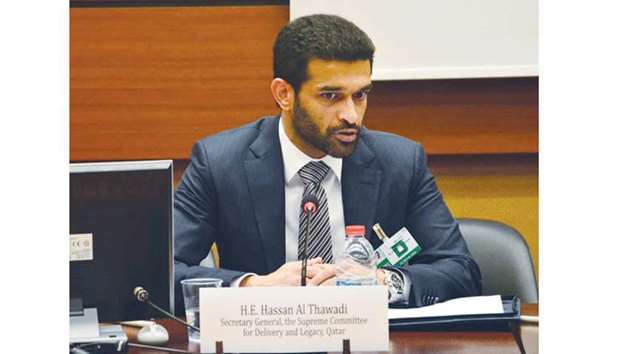The observation was made at an event organised by the Permanent Mission of the State of Qatar to the United Nations (UN) in Geneva under the title of “Hosting Mega Sport Events: Strengthening the Respect for Human Rights”, sc.qa reported.
Al-Thawadi and an accompanying delegation participated in the event in the presence of HE the Deputy Prime Minister and Foreign Minister Sheikh Mohamed bin Abdulrahman al-Thani.
The event, which took place on Monday on the sidelines of the 37th Session of the UN Human Rights Council (UNHCR), brought together leaders from various sports, government and civil society organisations to identify challenges and good practices on the role mega sporting events can play in promoting and protecting human rights.
It was inaugurated by HE Sheikh Mohamed, who in his opening remarks spoke about the ways sports and human rights were intertwined, stating: “Sport is a universal language for promoting and protecting human rights. In the same way that it can foster economic development, it can also enhance social inclusion and strengthen mutual understanding. Qatar is the host nation of the 2022 FIFA World Cup, the first mega sporting event in the region, as well as the 2019 IAAF World Athletics Championships, both of which are unique opportunities to promote the values of solidarity, social inclusion and the protection of human rights.”
Manabu Horii, Parliamentary Vice-Minister for Foreign Affairs of Japan, and Guy Ryder, director-general of the International Labour Organisation, also delivered opening remarks. Kate Gilmore, UN Deputy High Commissioner for Human Rights, and Rita Schiavi, chair of the International Women Committee at the Building and Wood Workers’ International (BWI) union joined the SC secretary-general in a panel discussion moderated by John Morrison, chief executive of the Institute of Human Rights and Business.
During the panel discussion, al-Thawadi spoke about the ways in which the spotlight on the 2022 FIFA World Cup has inspired fundamental progress in the sphere of human rights in Qatar. He said, “Our bid for the 2022 FIFA World Cup fully recognised the power of mega sporting events as truly transformational platforms that have the potential to accelerate positive change. We are realising that potential through the significant progress that we have made on workers’ welfare and our efforts are being recognised by the international community and civil society.”
He also emphasised the importance of ensuring that mega sporting events lead to genuine change and leave a human legacy for host nations and beyond, stating: “Leaving a lasting legacy is one of the key objectives of the 2022 FIFA World Cup, and there is no legacy more noble than human rights. When we started preparing for the 2022 FIFA World Cup, we realised that we would face challenges with workers’ welfare. We addressed the issue directly and committed to ensuring the health, safety, security and dignity of every worker on our projects.
“Our standards for contractors are rigorous and enforced and we have built partnerships with experts in the field such as BWI, to assist in ensuring that our accommodation and sites meet international standards and are a safe environment for workers.”
Schiavi reflected on the union’s work with the SC, stating that the progress being achieved in improving the welfare of workers on 2022 FIFA World Cup projects is setting an international benchmark that other mega event organisers can learn from.
During the panel discussion, Gilmore argued that human rights are inherently embedded within sports and as such the two should not be treated as mutually exclusive, drawing a historical account of various instances in which sport transcended political and cultural boundaries to bring people together to demonstrate her point.
From his side, Ryder affirmed the role mega sporting events have in promoting human rights, noting that while events often bring great challenges and corresponding obligations, they should be as much a celebration of human rights as they are of sports.

